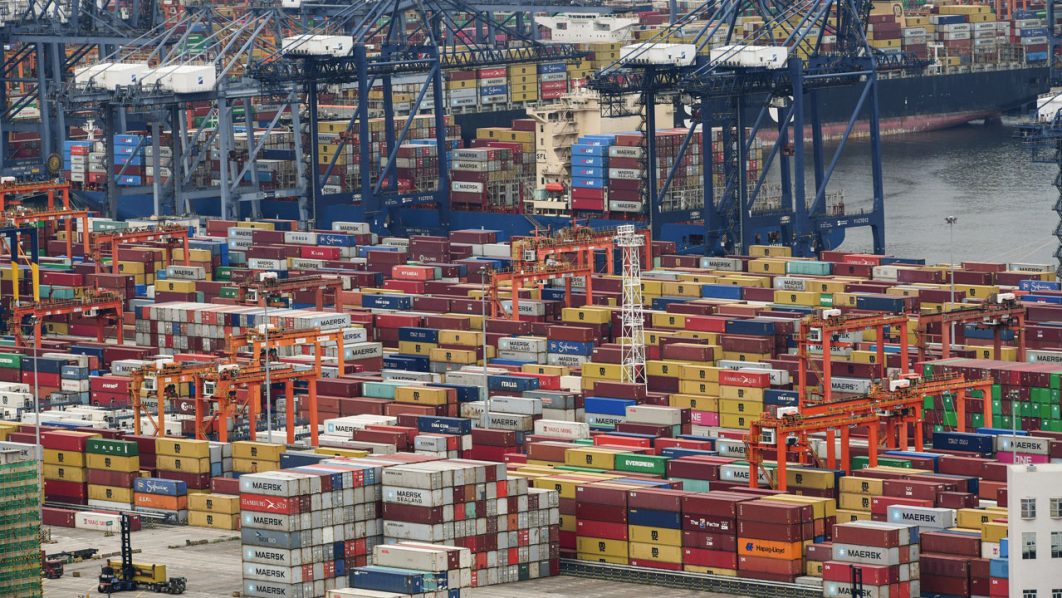
• Nigeria’s imports from Asian giant expanded 183 times in 27 years
• Regional leaders explore fresh Euro-Asian ties as AfCFTA struggles
• Outward-oriented trade threatens intra-African agenda
Intra-African trade routes may be facing a historic blockage as China expands its domineering influnce in the region, touted as the most commercially dependent across the globe.
Trade data gleaned from the National Bureau of Statistics (NBS) and analysed by The Guardian show that Nigeria has spent N19.12 trillion on imported commodities from China in less than four years – from January 2018 to September this year.
Economists have seen the deepening Chinese influence in the local market as a huge drain and cost on the ailing domestic economy as imports constitute leakages on any economy.
Sadly, Nigeria’s trade relations with China reflect the widespread imbalance the Southeast Asian country is known for. Within the referenced period, Nigeria exported a paltry N2.09 trillion worth of commodities to China, putting the trade deficit at N17.03 trillion.
In each of the quarters in the four years, China accounted for 27 per cent of Nigeria’s total imports, leading the country’s second top trading partner, India, and other top trading partners with a wide margin, in each of the years.
The first quarter of this year (Q1,2021) showed a N2 trillion import bill on goods freighted in China and moved across the sea to an import-dependent Nigeria. The figure is about three times the value of imports from the Netherlands, which was second to China on Nigeria’s import partner index. The Asian giant held 29.3 per cent of the value of the country’s total imports, which totaled N6.85 trillion in the quarter.
Data sourced from a joint platform of the China Africa Research Initiative and John Hopkins School of Advanced International Studies, yesterday, show that the value of Nigeria’s imports from China has increased by at least 400 per cent in the last decade – from 2009 to 2019 – and by 4,200 per cent in the last two decades stretching from 1999 to 2019.
In simple terms, the value has ballooned 42 times from 1999, when Nigeria transitioned to the current democratic era, to 2019, when the research organisations released the most recent data on the subject.
The country’s imports from China were $396.5 million in 1999, according to the research, but soared in the intervening years to $16.6 billion in 2019. From 1992, when the research work commenced to 1999, the import figures increased fourfold plus. The figures were a little above N90 million in 29 years ago.
This implies that the figures increased by almost 183 times or over 18,280 per cent in the past 27 years covered by the research, except that the analysis measures only the nominal growth but not the inflationary impacts during the period.
The rising obsession for Asian goods has not slowed down. Despite the restriction in movement last year, the country’s imports from China increased by one-third per cent to N5.7 trillion. The trend continued into the year. With figures for this quarter yet to be released, the country has already spent N6.53 trillion in foreign exchange on Chinese imports.
This puts the annualised estimate at N8.7 trillion, suggesting that 2021’s imports from China will surpass that of last year by over 50 per cent. With seasonal fluctuation expected during the fourth quarter (Q4,2021), the import bills may come close to the combined 2019 and 2020 figures, which were N10.04 trillion.
The past few years have witnessed a steady growth of imports from China. In 2018, its ratio to total imports was 19 per cent. It moved six percentage points to 25 per cent in 2019, and then up by another three percentage points in 2019. This year, the ratio to total imports stands at 30 per cent.
Sadly still, the trade relationship is skewed in favour of China, a similar trend across African countries. Nigeria’s exports to the Asian power are low and anaemic. Plus the 44,000 per cent growth witnessed from 1992 to 2019, the exports are still like a drop of water when compared with the value of commodities the country has sold to India.
Nigeria’s receipt from China’s export was less than $6 million in 1992, whereas its expenditure on imported goods from the same country was almost 100 million. Since then, China has grown its interest in Nigerian commodities by almost 444 times. Yet, its exports from Nigeria, in dollar terms, can barely offset a fraction of the FX Nigeria needs to pay for its imports.
The ratio of China’s purchases to the entire Nigeria export receipts in recent years ridicules what is expected of modern bilateral trade. It is about three per cent of the country’s total export in the past four years. Last year, the share was up five per cent but it dropped to four per cent from the beginning of the year, even though the exports have increased tremendously.
In absolute terms, exports to China from 2018 till September this year totaled N2.09 trillion or 10.9 per cent of the value of the country’s purchases from China in the period. As wide as the trade deficit is, the influence in terms of trade dominance and control of local production could be getting worse in the coming years as China intensifies its aggressive marketing and expands its Bamboo network in foreign countries.
Nigeria’s exports to China, as in the case of Europe and America, are majorly extractive commodities, whose production value chain and employment capacity are low.
The African Continental Free Trade Area (AfCFTA), a multilateral trade deal expected to re-channel the outward-oriented trade in the region, came into effect this year. Almost a year into the implementation, the Chinese influence in the continent seems firm and growing, eating deeper into the market share of the traditional trade blocs (Europe and America) and Africa itself.
In Nigeria’s case, the share of Africa, including the sub-regional bloc, the Economic Community of West African States (ECOWAS), is shrinking. The total value of trade between Nigeria and other ECOWAS members in the past four years was N5.4 trillion compared with N21.2 trillion traded on Nigeria-China official trade routes.
In the period also, Nigeria’s total imports from its sub-regional neighbours (ECOWAS) were less than three per cent (N456.8 billion) of what it imported from China.
Statistics of trade with the wider African market are not better. Nigeria sold N10.3 trillion worth of commodities to the continent and bought 28 per cent of that value, bringing the value of Nigerian-African trade to 13.25 trillion.
2019 was the brightest for Nigerian-African trade in recent years. Then, Africa’s share of Nigeria’s total import was seven per cent while its export was 20 per cent. But while the Chinese stake in the market is growing, that of Africa is going southward.
Last quarter, the continent’s share of exports of the biggest economy in sub-Saharan Africa was 13 per cent while its share in imports was three per cent. The figures have been trending downwards since last year, and AfCFTA, which is almost a year old, does not seem to have any serious impact, at least, not yet.
Like Nigeria, in other African countries, China is the big elephant, across the sub-regional markets. In fairness, the Chinese have increased their trade position with Africa, raising it 160 times in less than three decades, except that its imports from the continents have been disproportionately distributed.
For instance, in 2019, Nigeria’s trade balance with China was -$14 billion or 76 per cent of the value of trade between the two countries, which stood at $18.3 billion. But South Africa was able to narrow its deficit to -$7 billion or 26 per cent of its value of trade with China.
While South Africa sold goods worth $9.6 billion to the Asian country, the value of Nigeria’s export to China in the same year was only N2.7 billion, yet it spent slightly more on bilateral trade than South Africa did. A few countries like Zimbabwe got away with a positive trade balance with the Asian country.
As China continue its dominance in Africa, the continent’s trade relations with other regions, including Europe and America, are contracting. In the period Chinese-African trade value was estimated at $2.11 trillion, that of the United States-Africa was N1.33 trillion.
In 2019, Nigeria’s trade balance with the United States was healthy. Of the trade value of $7.93 billion or N3.29 trillion (using an exchange rate of N415/$), Nigeria’s exports were $4.76 billion or N1.98 trillion. Nigeria had a dominant share of 60 per cent in the trade.
As AfCFTA implementation committees are boxed in the complexity of establishing rules of origin and fine-tuning other administrative requirements to give the deal a footing, they will be grappling with China’s disproportionate influence in Africa.
Notwithstanding the direction and magnitude of data pointing to Africa’s outward-oriented trade, Secretary of the National Action Committee of AfCFTA, Francis Anatogu, said the current figures underscore the usual lag between when a policy comes into effect and when it begins to create the needed impacts.
He said what was important was that there “is awareness of the opportunities and what the people could benefit from. It will take years before you see the volume of trade grow. People will get to know about AfCFTA. When they do, they will begin to invest in what they will export.”
But an economic research expert at the Lagos Business School, Dr. Bongo Adi, sees efforts to boost intra-African trade as a hard sell. According to him, logistic constraints, homogeneity of products and high cost of production would continue to make consumption of Chinese goods cheaper.
In a telephone interview with The Guardian, Adi said: “We need to look at our product base. What do we produce that the rest of Africa will need? What do we import from China? Are they products that other African countries can supply? Africa imports manufactured products from the rest of the world, especially China.
“Everything comes cheaper from China. The way Nigeria looks up to China is the way Kenya looks up to China. Even if any African country can produce the same finished goods, we still buy from China, because China has a price advantage. In terms of logistics, there are lots of challenges. Accessing Kenya from Nigeria by sea may be more difficult than accessing Kenya from China. These are the challenges.”
The economists said addressing logistics challenges and fixing intra-Africa common infrastructure could be the starting point in expanding intra-African trade. But even with adequate infrastructure, he wonders how countries with largely similar agricultural produce could boost their trade ties.
He insisted that it would take a long while before any African country would be able to compete with China. That, he said, would mean producing medical equipment, for instance, in Nigeria, as cheap as Chinese companies would manufacture the same.
Also speaking, a global trade expert, Prof. Ken Ife, pointed out that the Chinese national incentives to its export-oriented companies “is unmatched” and that other Africans would need to outsmart that agenda to break the Chinese jinx. He described the imbalance in the trade relations as scandalous, adding that Nigeria could not continue with the wide hole of imports on the FX market.
“Our capacity to trade with the rest of African countries should rely on value addition. If we cannot add value to our products, there is a problem. We produce but the challenge is that our production cost is not competitive. We need to add value to our products to gain a competitive edge in the African market,” Ife noted. That competitive edge, he added, would need to be replicated across African markets to begin a gradual reduction of the Chinese hold on the region.






